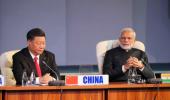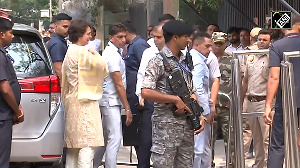'Victims of terrorism do not sit together with its perpetrators to discuss terrorism.'

India is likely to resist Pakistan's bid to be a full-fledged member of BRICS (Brazil, Russia, India, China, South Africa) because it wants to keep it a grouping for emerging market economies.
Pakistan has sought Russia's help to become a member during its BRICS presidency, which began on January 1, 2024, with the motto 'Strengthening Multilateralism for Equitable Global Development and Security'.
"Of course we will resist Pakistan's candidature for BRICS as its character as a grouping for emerging market economies shouldn't be lost. If we take all and sundry, then that character will be lost," a senior government official said.
"Pakistan will not contribute anything to BRICS and political issues will creep in, though bilateral issues are not allowed to be discussed in BRICS forums," the official added.
"Since a decision on adding new members is based on a consensus, we are confident of thwarting Pakistan's move," the official stated.
Taking over the baton of BRICS presidency on January 1, Russian President Vladimir Putin said Russia would work on the modalities of a new category of BRICS partner countries.
'We will consider the degree to which many other countries, about 30 of them, are prepared to join the BRICS multidimensional agenda in one form or another,' Putin stated.
'To this end, we will start working on the modalities of a new category of BRICS partner countries,' he added.
On January 1, Egypt, Ethiopia, Iran, Saudi Arabia, and the United Arab Emirates joined BRICS, making it a 10-member bloc, while Argentina has pulled out of its plans to join the grouping.
India and Pakistan are members of the South Asian Association for Regional Cooperation (SAARC) and Shanghai Cooperation Organisation (SCO).
While SAARC has remained dysfunctional mainly due to differences between India and Pakistan, both South Asian neighbours recently squabbled at SCO meetings.
The 19th SAARC Summit, which was scheduled to be held in Pakistan in 2016, was postponed after India, Afghanistan, Bhutan, Bangladesh and Sri Lanka decided to boycott the event.
Subsequent summits have not taken place due to the inability to reach a consensus on a venue.
During India's presidency of the SCO last year, External Affairs Minister S Jaishankar and his Pakistan counterpart Bilawal Bhutto Zardari were engaged in heated exchanges on terrorism and India abolishing the special status of Jammu and Kashmir.
While Bhutto Zardari put the onus on India to create a conducive environment for bilateral talks, Jaishankar took strong exception to that, calling him the 'spokesperson for a terrorism industry'.
'Victims of terrorism do not sit together with its perpetrators to discuss terrorism,' Jaishankar said at the SCO foreign ministers' meet in Goa in May last year.
Bilateral relations between the two neighbouring countries deteriorated after India revoked the special status of Jammu and Kashmir in August 2019 by removing sections of Article 370.
Subsequently, the Imran Khan government suspended all kinds of trade with India.
India in February 2019 had withdrawn the most-favoured-nation status for Pakistan and imposed a 200 per cent tariff on all imports from the country after the Pulwama terror attack.
But it didn't ban either exports or imports to Pakistan.
While trade between the two countries stood at $2.6 billion in FY19 before disruption, it plunged to $647 million in FY23. There were negligible imports by India from Pakistan.
Feature Presentation: Aslam Hunani/Rediff.com












 © 2025
© 2025